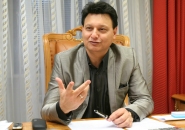|
|
 |
|
The Daily Beast: Mohammad Zahoor, Oligarch of Kiev
|
 |
| |
 17 December 2012
17 December 2012
We expect oligarchs from the former Soviet Union to have names like Boris or Roman, to love football, and to sound like John Malkovich’s KGB character in the cult poker film Rounders. So it comes as a surprise to meet Pakistan-born Mohammad Zahoor in Ukraine’s capital, Kiev, a cricket-loving oligarch with a weakness for spicy lamb korma.
An industrialist-turned-media mogul who made a fortune in the post-Soviet steel industry, the 57-year-old Zahoor is a white tiger—a foreigner in the oligarchs’ cabal. Like his rich compatriots, he has a home in the posh Hamptons neighborhood of London and divides his time between East and West. His wife is the glamorous blonde Ukrainian singer Kamaliya, a former Mrs. World, whose dance tracks have topped the U.K. charts. Their large mansion outside the city is shaped like Dubai’s Burj Al-Arab, lavishly decorated in an Asian-European fusion style with bright murals and gilt furnishings.
Unlike some of his compatriots though, Zahoor is still heavily invested in Ukraine. He built ISTIL Studios, a state-of-the-art television facility that creates highbrow shows for the local market. He’s also bought prime real estate in downtown Kiev and invested heavily in other television-related businesses.
His social standing in Kiev however, is linked to his ownership of its prestigious English-language weekly, the Kyiv Post. Having bought the loss-making paper for more than a million dollars in 2009, he has used his deep pockets to keep it afloat during these crisis years. It hasn’t been easy: critical of the government, the Kyiv Post is widely seen as an opposition newspaper, and is not an easy sell to advertisers. After a highly public spat with the editorial team last year over an article criticizing a government minister, though, Zahoor, ever the statesman, has stepped back and given a free rein to the paper’s editorial.
“Zahoor is the only crazy guy doing this—running an independent newspaper in this difficult environment,” says Walid Harfouche, deputy head of the government-run State Television Company.
In person though, Zahoor is a far cry from the stereotypical dissident publisher widely seen as a thorn in the government’s backside. When interviewed in his elegant office above a Maserati dealership in downtown Kiev, he comes across as more of a dandy than a gadfly, given his penchant for colorful, open-collared shirts and striped designer jackets. With his jet-black hair flopped over his playful features, and the tip of a silk handkerchief peeking out the side pocket of his jacket, he looks more Mad Men than rust-belt tycoon.
He’s very comfortable with his wealth and success, seeing it as the logical conclusion of a journey begun almost four decades ago, in 1974, when he enrolled in a university in Donetsk, in Soviet Ukraine, to study metallurgy. Though he moved back to work at a steel plant in Pakistan upon graduation, with a Russian wife he met at the university in tow, he didn’t stay there long. “Having a Russian wife limited my career development there,” he says. “The secret services were also very active during the ’80s, and I thought it better to leave.” He moved to Moscow to work for a Pakistani steel company in the late ’80s, and hasn’t looked back since.
He made his first fortune exporting Russian steel in the aftermath of the Soviet collapse in 1991. “The country was in a mess, and the mills had no idea how to export their product, let alone pay their mounting bills,” he recalls. Buying steel in cash from struggling mills—and often even paying the railways, utility companies, and other involved parties directly—he exported it worldwide through his company MetalsRussia, which he set up with a Thai partner. “It was a crazy time, and so many people had to be paid separately for one deal to go through,” he says. “But the margins were very high, and it was possible to make a killing.”
When Russia began to stabilize in the mid-’90s, and steel mills learned to tap global markets directly, Zahoor decided that it was time to invest in his own mill. Along with his partner, he bought the dying Donetsk Metallurgical Steel Mill in 1996, and set about modernizing the plant. In that respect, he was a forerunner to steel barons like Lakshmi Mittal who have begun to replicate his strategy in Eastern Europe in the past 10 years. “The plant had $150 million in debts, and was in complete disarray. We bought it on a privatization tender, and were the only ones who applied,” he says.
Source: The Daily Beast
|

![]() |



